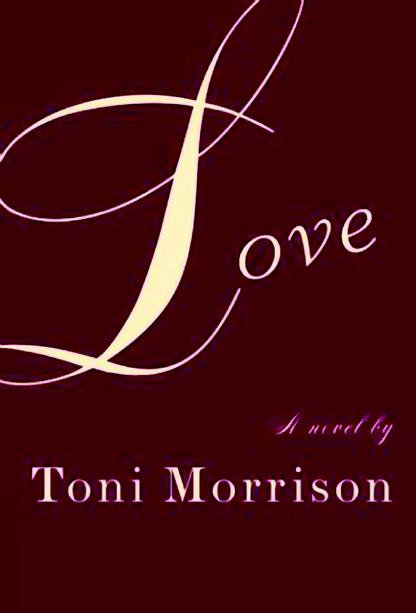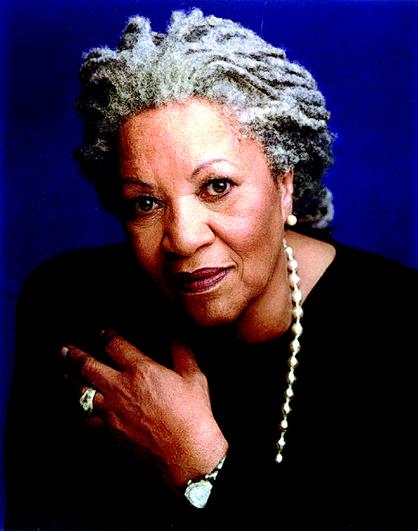I hadn't yet built up the courage to plow into the book when a couple of my dorky English major pals learned she was coming to speak at our university. We decided to check her out.
Morrison had just won the Pulitzer Prize for Beloved and already had enough of a following to allow her to deliver her reading in the largest auditorium on campus, a hall seating 800. That night, every seat was occupied. Even back in the late '80s, the monolithic African American scribe was well on her way to becoming a rock star.
Morrison loomed at the lectern, a stern, stocky woman with dreadlocks and a very imposing presence. She kicked the evening off by reading the first chapter of Beloved. Instead of sounding like a bunch of experimental pseudo-modernist hooey, as I'd expected, I heard that story as if it were meant to be read aloud. Morrison opened her book, opened her mouth, and the words flowed out like honey. This wasn't an avant-garde poseur towering before me, but a wise grandmother reading an ancient story etched in stone. The complex fragments flew around in a tornado of language but quickly dropped like jigsaw pieces into exactly the right places.
After she finished the chapter, she answered questions from the audience, but I barely listened. After the event was over, I ran back to my apartment and read the entire novel. Through it all, I heard Morrison's lovely voice reading to me as Sethe and her family struggle with the ghost of a dead baby. Reading Beloved the first time was one of the most pleasurable reading experiences in a life filled with pleasurable reading experiences. Almost overnight, I became more than a fan. I became a convert.
I read most of Morrison's other novels over the next couple years, but the memory of her voice gradually faded and so did the pleasure of reading her words. None of her other books quite lived up to my experience of Beloved. A couple of my friends told me Song of Solomon was a better book, and I did like it, but it didn't consume me in quite the same way. Sula came close. The maligned Jazz, which Morrison published after Beloved, I liked a lot. Still, it really didn't compare.
I reread Beloved once, but when Paradise came out a few years ago, I didn't even bother with it. Morrison had won the Nobel Prize by then. In the process, she became more than just a brilliant writer. She became an icon. The literary public either worshiped her as the absolute best living practitioner of modern literature or loathed her beyond all reason as some kind of imposter. It was as if the mere idea of Toni Morrison had become more important than her books.
My passion for her waned. I haven't read her novels in years. So when I picked up Love, Morrison's latest, I didn't have very high expectations. The cover didn't help. In a word, it looked cheesy, as did the gigantic supermarket paperback photo on the back featuring Morrison flaunting her pearls, fancy watch and giant diamond ring.
They say you can't judge a book by its cover, though, and every once in a while that dubious cliché proves true. Such is the case here.
In Love, Morrison has crafted another complex, multi-generational fiction. It shares the same twin political themes as all her other novels, focusing on the scummy underbelly of race and gender in America. Yet although Morrison's political messages are usually pointed and accurate, they're never the most interesting part of her work. That's as true of Love as it is of any other Morrison novel. Her true strength lies in straight-up unabashed luridness, and I mean that as a compliment. Among other well-integrated oddities, the novel incorporates race riots, gang rapes, acts of prostitution and physical mutilations. For good measure, it's also got an obscene sexual secret and a ghost.
The story revolves around a patriarchal figure named Bill Cosey, the rich, Black owner of what once was the most elegant and famous resort for Black folks on the East Coast. For reasons it's best not to disclose, the women in his life—Heed, Christine, L, May and Vida—have plenty of cause to both love and hate him.
Morrison uses a moderately experimental narrative structure similar to the ones she's used in the past. The reader gets force-fed a few fragments of story in the introductory chapters. These contain information that at first doesn't make much sense. Patience, though, is always rewarded, and eventually everything falls into place.
Morrison is occasionally accused of writing contrived tales, and in my experience, these accusations are frequently justified. Love certainly contains numerous outlandish narrative twists, but they don't bother me. For the most part, they serve the story well.
The novel is intricate, but extremely well plotted. In the beginning, the reader learns that two old ladies—Heed and Christine—loathe each other and that they were somehow attached to Bill Cosey, who is now dead. You don't really know why they hate each other or how they were attached to Cosey. The careful unfolding of these secrets provide the main emotional thrust of the novel.
Long-time fans will be pleased to know that as a prose stylist Morrison still has the gift. Some passages feel a little stiff, but others are gorgeous and some are even funny. For most of the book, Christine finds herself caring for Heed, a woman she despises. This passage is a perfect encapsulation of her resentment:
“Again, Christine felt the sheer bitterness of the past two decades tramping up and down the stairs carrying meals she was too proud to ruin, wading through layers of competing perfumes, … collecting soiled clothes, washing out the tub, pulling hairs from the drain—if this wasn't hell, it was the lobby.”
It's this kind of polished, down-home story-telling, steeped in a deep sense of her characters' inner lives, that makes Morrison's new book such a great read. I don't know if she deserves all the mountains of praise piled on top of her over the last decade, but after reading this book I'm sure the scorn she's received in almost equal measure is unfair. Love is a damn good novel by a very gifted writer.










